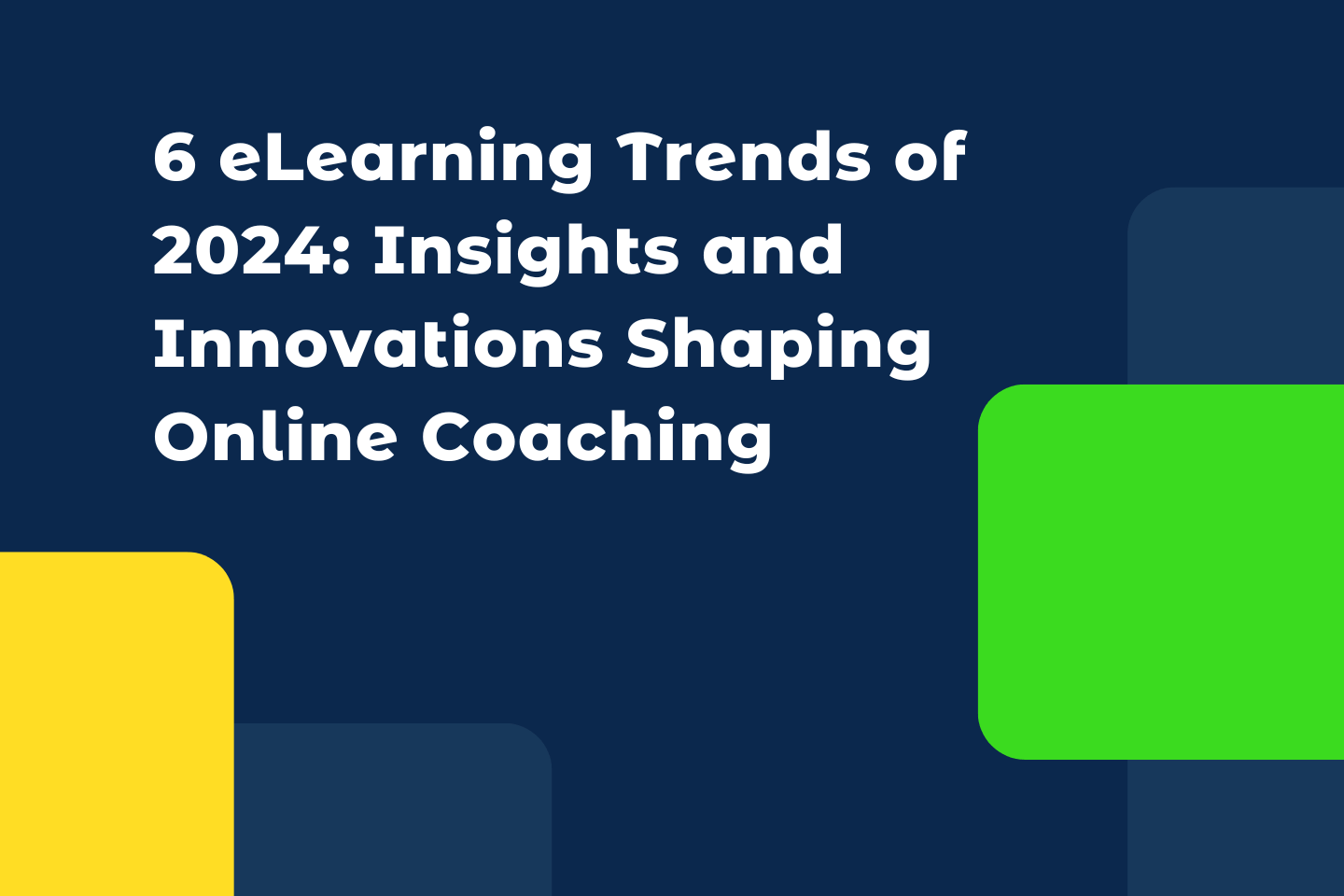In 2024, eLearning trends are centered around personalized and efficient learning experiences.
We can expect to see online coaching platforms, microlearning, and immersive VR/AR training as frontrunners, but there are also other noteworthy trends to keep an eye out for. In this article, we both explore what those trends are and how they are making learning more interactive and accessible, enabling you to stay at the forefront of eLearning developments.
Trend #1: Rise of Online Learning Platforms
One of the biggest eLearning trends is the rise of online learning platforms as they are transforming online education – and coaching, too. These technologies offer personalized learning experiences tailored to individual needs, redefining the traditional one-size-fits-all approach to education.
The Benefits Coaches Can Enjoy
Online coaching platforms like upcoach offer customized coaching programs tailored to individual client needs. Coaches can create specific modules, lessons, and interactive elements such as tasks, habits, accountability check-ins, and smart documents. These features enable coaches to provide clear, actionable steps for clients, ensuring a personalized and effective coaching journey.
Coaches can design custom programs for one-on-one or group settings, allowing for a tailored coaching experience. This flexibility ensures that each client receives the attention and support they need to achieve their goals. In addition, they can manage project systems and monitor tasks, fostering accountability and consistent progress.
The other features of upcoach include:
- Client interaction and engagement: You gain access to interactive tools like Smart Docs, which are used for creating journals and worksheets that enhance client engagement.
- Comprehensive management tools: upcoach offers a CRM system to manage client information, meeting and event scheduling, payment processing, and a centralized file management system. These tools streamline administrative tasks, allowing coaches to focus more on delivering impactful coaching sessions.
Trend #2: Microlearning: Concentrating Knowledge in Bite-Sized Modules

It seems that the need for digestible, concise learning is more pressing than ever. Microlearning, a method that delivers educational content in bite-sized modules, is designed as short, focused units that can independently stand on their own. By breaking content down into concise, manageable segments, microlearning allows learners to acquire new skills and knowledge without the risk of becoming overwhelmed.
The content in microlearning is often enhanced with multimedia, which assists in maintaining engagement and facilitating a deeper understanding of the material. This method is particularly effective in catering to the shortened attention spans of modern learners, enabling them to grasp complex concepts quickly and retain this knowledge effectively over time.
Enhancing Retention Rates
Microlearning is not a gimmick. This method of studying delivers incredible results. Retention rates have seen a significant improvement, showing an increase to 40-60% in 2023 compared to the 8-10% increase seen with traditional learning methods.
This method easily fits into learners’ busy schedules by allowing content consumption in small increments, which facilitates easier retention and application of information in real-world contexts.
Application in Corporate Training
Microlearning is another of those eLearning trends that has the potential to change how corporate training is carried out. It offers targeted content that can improve both knowledge retention and practical application. And the best thing about it all is that employees can carry out their everyday tasks without feeling overburdened.
The benefits of microlearning in corporate training include:
- Enhanced knowledge retention
- Improved practical application
- Increased engagement and motivation
- Flexibility and accessibility
- Cost-effectiveness
Trend #3: Virtual and Augmented Realities: Immersive Experiences in Online Training

Virtual reality and augmented reality are no longer a thing of the future; they are here, now, and demand attention. These technologies are revolutionizing online training by simulating realistic scenarios and crafting engaging, experiential learning environments. The implementation of VR and AR in a cost-effective manner is achievable through employing 360 videos, utilizing mobile-based VR applications, and establishing VR-equipped spaces.
Practical applications of VR and AR in training include:
- Simulating customer service encounters
- Leadership development through interactive experiences
- New employee orientations, accommodating different learning styles through hands-on experience
Soft Skills Enhancement Through Immersion
Beyond technical skills, VR and AR are also enhancing soft skills. Virtual reality provides a highly immersive environment that facilitates the enhancement of soft skills, particularly those that involve interactions, such as:
- public speaking
- teamwork
- leadership
- empathy
- problem-solving
Trend #4: Mobile Learning: Accessibility and Flexibility in Education
Mobile learning is redefining accessibility and flexibility in education. With mobile learning, businesses can facilitate educational access at any location and help individuals with tight schedules develop their skill sets at their convenience.
Mobile devices serve as an ideal platform for delivering microlearning content, providing bite-sized learning opportunities that are well-suited to the on-the-go nature of today’s learners. It’s also an ideal framework for coaches to structure their courses and programs.
The Impact on Lifelong Learning
Mobile learning is becoming an integral part of lifelong learning. It is particularly beneficial for middle-aged adults who are adapting to changes in career or personal development. The flexibility and ease of access offered by mobile learning platforms play a crucial role in fostering an environment conducive to continuous education.
Individuals engage in mobile learning not only for professional upskilling but also for personal growth in spiritual, emotional, and physical aspects – again, offering coaches a perfect opportunity to create engaging coaching materials. The alignment of mobile learning with the dynamic lifestyles of learners exemplifies its vital role in facilitating the lifelong learning process.
Trend #5: Social Learning: Collaborative Approaches to Online Education

Learning is not a solo journey. It’s a social process, and social learning platforms are embedding this philosophy into online education. These platforms facilitate collaboration, discussions, and improvement of soft skills, which are critical components in modern eLearning.
Likewise, community building and participation is one of the crucial elements of successful group coaching and member accountability.
Key features of social learning platforms include interactive whiteboards, live chat functionality, real-time co-editing tools, chats, posts, hashtags, personal stories, sharing lessons, creating study groups, and activating gamified elements.
A a coach, you can engage learners by:
- Creating competitions
- Spurring development in your community by giving members access to forums and knowledge sharing
- Asking for participation such as relevant articles, videos, images, and other assets shared via your community forums and boards
Through the use of these interactive features, social learning platforms enhance the overall coaching and learning experience by enriching knowledge sharing and peer-to-peer interaction.
#6: Blended Learning: The Best of Both Worlds

Blended learning is bridging the gap between traditional and online education. It’s an educational approach that combines traditional classroom methods with online modules, offering a variety of tools and strategies to enhance the learning experience. This approach encourages self-paced and continuous learning, facilitated by features such as:
- Gamification
- Mobile accessibility
- Supportive tools for collaboration
- Building learning communities
Despite the digital transition, blended learning strives to maintain the value of live, face-to-face interactions, which are central to traditional learning environments. For coaches, the opportunities here are endless – you can create unique programs with the best from both worlds, balancing the power of online tech with the thrill of in-person events and community meetups.
Scenario-Based Learning (SBL)
Scenario-based learning is another notable trend when it comes to eLearning 2024 trends, set to revolutionize the landscape by immersing learners in realistic scenarios that enhance critical thinking, decision-making, and problem-solving skills.
This method boosts engagement and retention by placing learners in lifelike situations where they must apply theoretical knowledge practically. SBL bridges the gap between theory and practice, making learning experiences more relevant and impactful. In corporate coaching, SBL is used to simulate workplace scenarios, improving skills in customer service, compliance, and leadership.
Conclusion
The eLearning industry trends of 2024 are marked by innovation and adaptability, with emerging trends such as online coaching technologies, microlearning, and immersive VR/AR training leading the way.
These advancements are making coaching and learning more personalized, interactive, and accessible, enhancing both the effectiveness and engagement of educational experiences.
